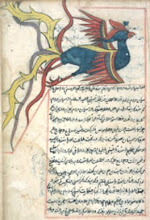I very much doubt that I am the first poet in the long history of our fraternity to lie awake at night and imagine away the roof over his head.
I tend to lie very still on my back (a legacy of an early childhood in callipers for which I have been dubbed by my cover girl, Suzie, “the crippled foundling”), and when taken by one of those desolate moods that visit the sleepless on a still night, I seem to be able to feel that whole vast empty expanse of sky pressing down on me.
But slowly an even more oppressive thought springs to mind, namely that nothing but air, the colourless tasteless mixture of gases I use to breath and make words, lies between me and the infinite cogitations of chance events that drive the cosmos into which I was born with my crooked legs and hazy provenance.
As more and more of us become cocooned in the perennial urban twilight, it is easy to forget or overlook the hold the sky still has on our subconscious.
For instance, it is currently nesting season in the mountains where I live, and I feel my hair stand on end at every flap and whoosh above my head as I walk my dog through the gauntlet of magpies and currawongs in the scrub near my home. Surely this is a primordial reflex we have inherited from a time when the sky was even more menacing than it is now, although considering the satellite that is plummeting to earth as I write, we have managed to populate it with our own litany of perils.
And as we delve deeper into the machinations of the cosmos, I mean the clockwork Newtonian stuff, we have become increasingly aware of the likelihood of a meteor striking us anywhere at anytime, one of the rare occasions when knowledge does not in fact equal power, but something very different altogether, the colourless, odourless plague of our time.
As a child I was lucky enough to drift through the clouds to the far side of the world. I seemed to spend half my days up there amidst the fluffy castles and kind old rabbit men while scouring for whales in the ocean miles below. I was entranced by the silent world of the sky and did not feel the weight of it then as I do now, for it did not seem an empty desolate space then, but one filled with a benign spirit.
What has changed, I wonder? Am I merely growing old and deaf to the whispers of God, of that Great Other? Or do I merely see as far as the miracle of the wingtip and not to the clouds beyond? Are human achievements any less miraculous than a wave breaking on the shore? God, after all, did not invent the aeroplane (to paraphrase an acerbic Frenchman). Is this inability to see past the wingtip a crippling malaise in one who purports to be a poet? And could it be the source of this shapeless, floating anxiety I suffer along with so many of my contemporaries? Is the man who fears the sky the one who knows too much or too little?
* The title of this post is borrowed from a poem in Beyond the Terminus (Bluepepper), due out some time next year.





